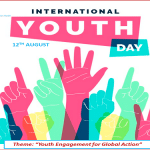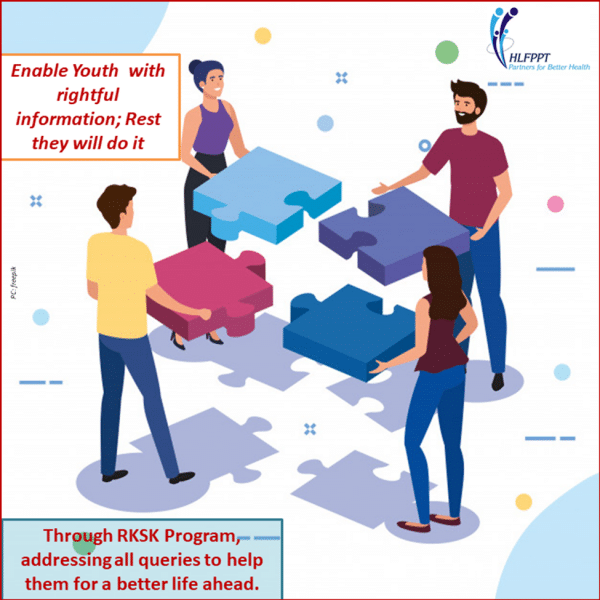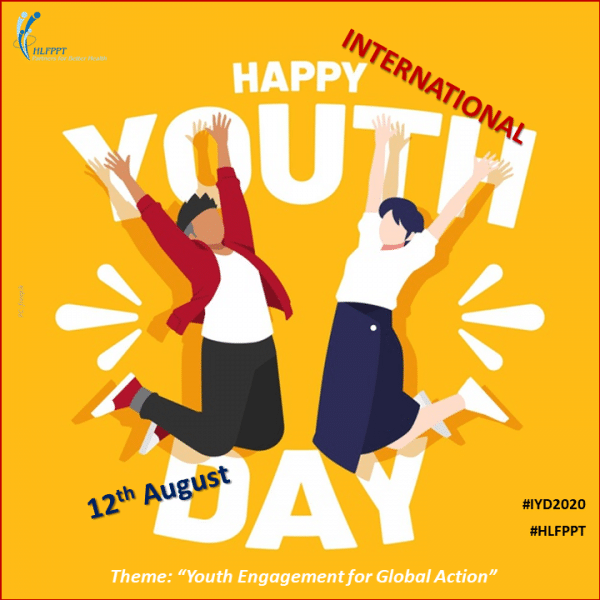Couple Years of Protection:
1,59,72,012: Male Condom
14,53,802: OCP
18,75,063: IUCD
7,839: Male Sterilisation
13,26,949: Female Sterilization
27,325: Injectable – DMPA

The theme of International Youth Day 2020 (IYD2020), “Youth Engagement for Global Action” seeks to highlight how the engagement of young people at the local, national and global levels is enriching national and multilateral institutions and processes. With just 10 years at hand to achieve the Sustainable Development Goals (SDG), institutions (both public and private) needs to strengthen the capacity of their systems and processes to act in concert and implement solutions to pressing challenges and threats. In the present scenario, the challenges such as the COVID-19 outbreak and climate change require a global action with meaningful engagement and participation of young people.
A country’s ability and growth potential is determined by the size of its youth population. The energy and passion of the youth if utilized properly can bring huge positive change to the society and progress to the nation. As per India’s Census 2011, Youth (15-24 years) in India constitutes one-fifth (19.1%) of India’s total population. India is expected to have 34.33% share of youth in total population by 2020. It is observed that India has a relative advantage at present over other countries in terms of the distribution of the youth population. In recent times, there are tremendous opportunities for youth to show their strengths as a strong self-organizing force with the potential for innovation and for embracing change.
 The Rashtriya Kishor Swasthya Karyakram (RKSK) programme was launched by the Ministry of Health and Family Welfare, GoI with a focus to reach out to adolescents – male and female, rural and urban, married and unmarried, in and out-of-school adolescents with special focus on marginalized and underserved groups on six different modules: Nutrition, Sexual reproductive health, Non-Communicable disease, Drug Abuse, Gender-based violence and Mental Health.
The Rashtriya Kishor Swasthya Karyakram (RKSK) programme was launched by the Ministry of Health and Family Welfare, GoI with a focus to reach out to adolescents – male and female, rural and urban, married and unmarried, in and out-of-school adolescents with special focus on marginalized and underserved groups on six different modules: Nutrition, Sexual reproductive health, Non-Communicable disease, Drug Abuse, Gender-based violence and Mental Health.
From 2017, under the guidance of National Health Mission (NHM)-Madhya Pradesh, HLFPPT is implementing the RKSK programme in Barwani district of Madhya Pradesh. In the district, HLFPPT is providing support in eight Adolescents Health Friendly Clinics (AHFC) of Community Health Centres (CHC) and one at District Hospital (DH) through its trained counsellors. Subsequently, support is also being provided through supportive supervision to the trained Sathiya (the name given to Peer Educators in Madhya Pradesh) by the trained master trainers in the identified villages of the district. The master trainers are also responsible to support ASHA in identifying potential proactive Sathiya in their operational areas for six days of comprehensive training on the programmatic areas under RKSK. Till date, HLFPPT in partnership with NHM-MP has been able to train over 900 peer educators both male and female and AFHC centres had registered and counselled over 7000 male and female adolescents. Under this programme, a set of different community-level activities are carried out at each block every month. Our RKSK team of Barwani has supported in awareness generation programme under the national programme of “National Tobacco Control Programme”. Such awareness programme has been conducted in nearby schools, health facilities and in the community for a holistic approach. Activities like Quiz competition, Essay writing and Elocution contests among the student under different thematic areas of RKSK were initiated.
 Owing to the prevalent COVID-19 pandemic, the RKSK programme under NHM in Madhya Pradesh opted to continue its uninterrupted services virtually/ telephonically. Counselling was conducted by the Master Trainers under the RKSK programme: To provide vital and relevant information regarding COVID-19 in terms of Accessibility, Availability & Affordability for related services and also to continue with the counselling services under the RKSK programme. During this pandemic, the Master Trainers were deployed to directly intervene with the SAATHIYA to have a better approach in tackling the present prevalent situation.
Owing to the prevalent COVID-19 pandemic, the RKSK programme under NHM in Madhya Pradesh opted to continue its uninterrupted services virtually/ telephonically. Counselling was conducted by the Master Trainers under the RKSK programme: To provide vital and relevant information regarding COVID-19 in terms of Accessibility, Availability & Affordability for related services and also to continue with the counselling services under the RKSK programme. During this pandemic, the Master Trainers were deployed to directly intervene with the SAATHIYA to have a better approach in tackling the present prevalent situation.
The health situation of this age group is a key determinant of India’s overall health, mortality, morbidity and population growth scenario. Therefore, investments in reproductive and sexual health, nutrition, gender-based violence, drug abuse and complications under NCDs will yield dividends in terms of delaying the age at marriage, reducing the incidence of teenage pregnancy, meeting unmet contraception need, reducing the maternal mortality, reducing STI incidence and reducing HIV prevalence. It will also help India realize its demographic dividends, as healthy adolescents are an important resource for the economy.